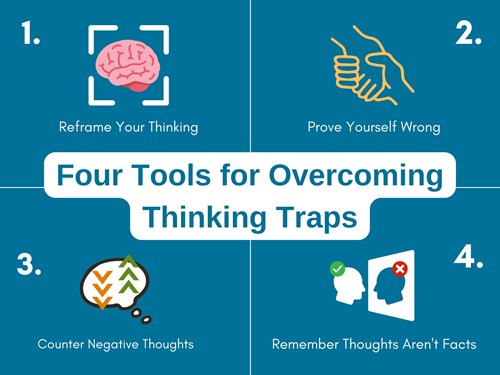It's easy to fall into negative thinking patterns and spend time bullying yourself, dwelling on the past, or worrying about the future. It's part of how we're wired—the human brain reacts more intensely to negative events than to positive ones and is more likely to remember insults than praise.
During tough times, negative thoughts are especially likely to spiral out of control. When these thoughts make something out to be worse in your head than it is in reality, they are often called "thinking traps".
What Is a Thinking Trap?
Thinking traps are cognitive distortions—exaggerated or irrational negative thought patterns that can lead us to believe things that aren’t necessarily true. These distorted thoughts can be very damaging because they can impact our emotions and behaviors—and lead to depression and anxiety.
Common Thinking Traps
There are many different types of thinking traps, but they all share one common element: they distort our view of reality in some way.
There are a variety of thinking traps that can keep us from making rational decisions. Here are some of the most common:
-
Overgeneralization:
- Making a broad statement based on one situation or piece of evidence.
-
Personalizations:
- Blaming yourself for events beyond your control; taking things personally when they aren't actually connected to you.
-
Filtering:
- Focusing on the negative details of a situation while ignoring the positive.
-
All-or-Nothing Thinking:
- Only seeing the extremes of a situation.
-
Catastrophizing:
- Blowing things out of proportion; dwelling on the worst possible outcomes.
-
Jumping to Conclusions:
- Judging or deciding something without all the facts.
-
Emotional Reasoning:
- Thinking that however you feel is fully and unarguable true.
-
Discounting the Positive:
- Explaining all positives away as luck or coincidence.
-
"Should" Statements:
- Making yourself feel guilty by pointing out what you should or shouldn't be doing, feeling, or thinking.
How to Get Out of a Thinking Trap
Fortunately, most cognitive distortions are self-correctable with a bit of practice. If you or someone you know are struggling to get out of thinking traps that affect their mental health, Mental Health America and the mental health professionals at Dakota Family Services offer the following tips for challenging negative thoughts.

1) Reframe.
Think of a different way to view the situation.
If your negative thought is "I can't do anything right," a kinder way to reframe it is, "I messed up, but nobody's perfect."
Or a more constructive thought is, "I messed up, but now I know to prepare more for next time."
It can be hard to do this when you're feeling down on yourself, so ask yourself: What would you tell your best friend if they were saying those things about themself?
2) Prove yourself wrong.
The things you do impact how you feel—what actions can you take to combat your negative thoughts?
For instance, if you're telling yourself you aren't smart because you don't understand how the stock market works, learn more about a subject you understand and enjoy, like history.
If you feel like no one cares about you, call a friend. Give yourself evidence that these thoughts aren't entirely true.
3) Counter negative thoughts with positive ones.
When you catch your inner dialogue being mean to you, make yourself say something nice to balance it out. This may feel awkward in the beginning.
Name things you love, like, or even just don't hate about yourself—we all have to start somewhere! Practicing gratitude can also help when you're struggling with negative thoughts about your situation or surroundings.
4) Remember: thoughts aren't facts.
Your thoughts and feelings are valid, but they aren't always reality. You might feel ugly, but that doesn't mean you are.
Oftentimes, we can be our own worst enemies—other people are seeing us in a much nicer light than how we see ourselves.


